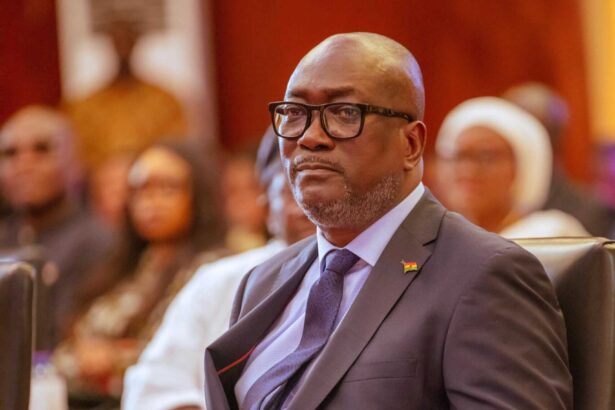President Mahama, on January 30, 2025 officially inaugurated an eight-member Constitutional Review Committee and charged that “this process must not become another chapter in the history of unfulfilled reform efforts.”
I favour a review and my proposal is for a revised Constitution that will ensure the elimination of extreme and unbridled partisanship. Gone should be a Parliament where the MPs engage in fisticuff and slash the face of a Member with a sharp object (suspicion is that it was a razor blade) merely because the National Democratic Congress (NDC)/New Patriotic Party (NPP) did not agree on E Levy.
Partisanship gets bizarre, indeed, when an “Honourable” member can snatch a ballot box and attempt to run away with it in the election of a Speaker.
It is a shame that in a country that totally depends on “development partners” to fund scientific research, in a 21st century ruled by Artificial Intelligence, the smartest we, Ghanaians, can be is for politicians to borrow money from the bank to buy delegates curved TV sets, fridges, etc.
Arrangement
The Winner Takes All arrangement promotes extreme adversarial competition that elects an overbearing President with unrestrained power to do just as they likes, including making over 7,000 appointments.
Away must be this system under which NDC/NPP supporters seize state property, including public toilets and toll booths, for themselves immediately after it becomes clear that their Presidential candidate has won.
We must not merely tinker with this system; we must uproot it.
Remember Prof. Kwesi Yankah’s story on his Facebook page about a Nasara Coordinator for the NPP, who lay in critical condition, “his two fingers nearly chopped off and a hail of pellets lodged in the left side of his body frame”, victim of an NPP/NDC bloody clash?
Why would Chairman Wontumi curse Prophet Owusu Bempah live on the radio because the latter had prophesied a win for the NDC?
The motivation was obvious: if the prophecy came true, the very source of his livelihood could be no more.
In an entitlement mentality guaranteed by Article 58 (1) of the 1992 Constitution, Ghanaian Presidents can change a pauper into a millionaire.
Question: Why haven’t we changed this system of governance?
One, the vast majority of Ghanaians do not know the existence of other tried and tested systems of representation; two, the gatekeepers of the present system are too comfortable under it and they are the ones who ultimately decide our fate; three, constitutional reviews are not far-reaching enough.
We fear to dare beyond what we have become familiar with.
But it need not be so. How about adopting our traditional system of governance where election starts from the “family to the clan to the division to the chief’s council?
If it looks outdated, we have eminent political scientists, etc. whom we can gather to make it acceptable in the modern age.
Alternatively, let’s borrow from Kenya.
Before 2010, Kenya had had a long history of civil unrest following announcements of election results.
In the run-up to the 2007 elections, for instance, Kenyans stocked up on staples like flour, rice and bread, in case riots broke out.
As feared, that year’s presidential election results sparked widespread violence. An estimated 1,500 people died.
Kenya decided that only by changing the political system could something similar be prevented. The outcome was the 2010 revised Constitution.
The Kenyan system of governance is one that leaves no one behind and makes democracy less costly and more inclusive.
Under it, many of the appointment powers previously enjoyed by the President have been made subject to parliamentary review.
Under a new system of devolution, 47 new counties were created, each with a directly elected governor, senator, women’s representative and assembly.
Devolution - call it decentralisation - has worked for Kenyans. The impact has been largely felt through two layers of elected officials: governors and MCAs.
Holders of the devolved positions at the local level enjoy control over significant resources. Governors enjoy a budget that far exceeds that of MPs and can construct their own patronage networks through their control of contracts and appointments.
Also, the introduction of local government has softened the blow of losing national elections. Parties and communities that lose national-level elections feel that they still have a stake in the political system as a result of their representation at the county level.
Above all, there is no longer a sense that the presidency is the ultimate prize, or that one has to be an MP to matter in the society.
There will be elections, yes, but the Presidential and Parliamentary candidates will not be sponsored by political parties.
They will campaign like candidates for Assemblymen <\a> on their own achievements.
Proportional
Another possible alternative is the concept of Proportional Representation.
We should be able to practice a system in which every political party with representation in Parliament could be allotted a number of appointments.
That way, the greed will reduce; the bootlicking will cease and we shall stop hacking down each other.
The writer is the Executive Director, Centre for Communication and Culture.
E-mail: ashonenimil@gmail.com

